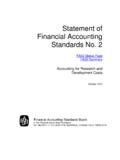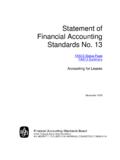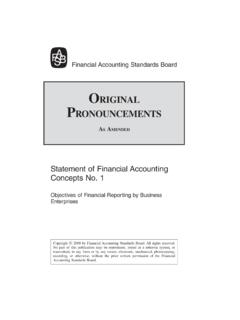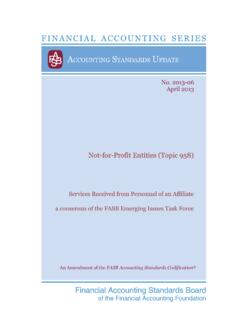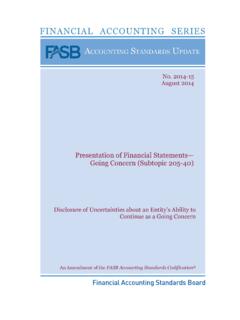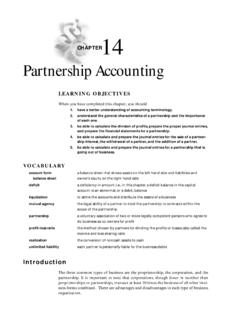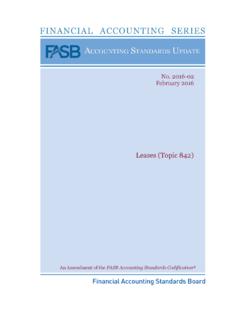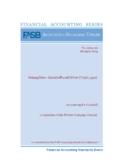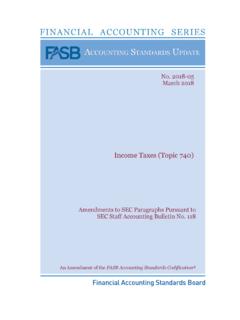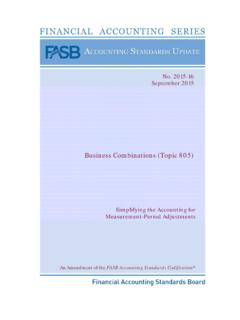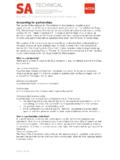Transcription of Business Combinations (Topic 805) - FASB
1 Business Combinations (Topic 805) No. 2014-18 December 2014 accounting for Identifiable Intangible Assets in a Business Combination a consensus of the Private Company Council An Amendment of the FASB accounting Standards Codification The FASB accounting Standards Codification is the source of authoritative generally accepted accounting principles (GAAP) recognized by the FASB to be applied by nongovernmental entities. An accounting Standards Update is not authoritative; rather, it is a document that communicates how the accounting Standards Codification is being amended. It also provides other information to help a user of GAAP understand how and why GAAP is changing and when the changes will be effective. For additional copies of this accounting Standards Update and information on applicable prices and discount rates contact: Order Department Financial accounting Standards Board 401 Merritt 7 PO Box 5116 Norwalk, CT 06856-5116 Please ask for our Product Code No.
2 ASU2014-18. FINANCIAL accounting SERIES (ISSN 0885-9051) is published quarterly by the Financial accounting Foundation. Periodicals postage paid at Norwalk, CT and at additional mailing offices. The full subscription rate is $242 per year. POSTMASTER: Send address changes to Financial accounting Standards Board, 401 Merritt 7, PO Box 5116, Norwalk, CT 06856-5116. | No. 407 Copyright 2014 by Financial accounting Foundation. All rights reserved. Content copyrighted by Financial accounting Foundation may not be reproduced, stored in a retrieval system, or transmitted, in any form or by any means, electronic, mechanical, photocopying, recording, or otherwise, without the prior written permission of the Financial accounting Foundation. Financial accounting Foundation claims no copyright in any portion hereof that constitutes a work of the United States Government. An Amendment of the FASB accounting Standards Codification No.
3 2014-18 December 2014 Business Combinations (Topic 805) accounting for Identifiable Intangible Assets in a Business Combination a consensus of the Private Company Council accounting Standards UpdateFinancial accounting Standards Board accounting Standards Update 2014-18 Business Combinations (Topic 805) accounting for Identifiable Intangible Assets in a Business Combination December 2014 CONTENTS Page Numbers Summary .. 1 3 Amendments to the FASB accounting Standards Codification .. 5 14 Background Information and Basis for Conclusions .. 15 24 1 Summary Why Is the FASB Issuing This accounting Standards Update (Update)? The Private Company Council (PCC) added this issue to its agenda in response to feedback from some private company stakeholders indicating that the benefits of the current accounting for identifiable intangible assets acquired in a Business combination may not justify the related costs. By providing an accounting alternative, this Update reduces the cost and complexity associated with the measurement of certain identifiable intangible assets without significantly diminishing decision-useful information to users of private company financial statements.
4 Therefore, the amendments in this Update meet the overall objective of the Private Company Decision-Making Framework: A Guide for Evaluating Financial accounting and Reporting for Private Companies for addressing the needs of private company stakeholders. Who Is Affected by the Amendments in This Update? The amendments in this Update, at an entity s election, apply to all entities except for public Business entities and not-for-profit entities as defined in the Master Glossary of the FASB accounting Standards Codification . The accounting alternative applies when an entity within the scope of this Update is required to recognize or otherwise consider the fair value of intangible assets as a result of any one of the following transactions (in-scope transactions): 1. Applying the acquisition method under Topic 805 on Business Combinations 2. Assessing the nature of the difference between the carrying amount of an investment and the amount of underlying equity in net assets of an investee when applying the equity method under Topic 323 on investments equity method and joint ventures 3.
5 Adopting fresh-start reporting under Topic 852 on reorganizations. An entity within the scope of this Update that elects to apply the amendments is subject to all of the recognition requirements within the accounting alternative. The accounting alternative, when elected, should be applied to all in-scope transactions entered into after the effective date. What Are the Main Provisions? An entity within the scope of this Update that elects the accounting alternative to recognize or otherwise consider the fair value of intangible assets as a result of 2 any in-scope transactions should no longer recognize separately from goodwill (1) customer-related intangible assets unless they are capable of being sold or licensed independently from the other assets of the Business and (2) noncompetition agreements. An entity that elects the accounting alternative in this Update must adopt the private company alternative to amortize goodwill as described in FASB accounting Standards Update No.
6 2014-02, Intangibles Goodwill and Other (Topic 350): accounting for Goodwill. However, an entity that elects the accounting alternative in Update 2014-02 is not required to adopt the amendments in this Update. How Do the Main Provisions Differ from Current Generally Accepted accounting Principles (GAAP) and Why Are They an Improvement? For entities electing this alternative, the amendments generally will result in those entities separately recognizing fewer intangible assets in a Business combination when compared to entities that do not elect or are not eligible for this alternative. Currently, an acquirer recognizes most assets acquired and liabilities assumed in a Business combination at their acquisition-date fair values, including all intangible assets that are identifiable. An intangible asset is identifiable if it meets either of the following criteria: 1. It arises from contractual or other legal rights, regardless of whether those rights are transferable or separable from the entity or from other rights and obligations.
7 2. It is separable, that is, capable of being separated or divided from the entity and sold, transferred, licensed, rented, or exchanged, either individually or together with a related contract, identifiable asset, or liability, regardless of whether the entity intends to do so. The accounting alternative in this Update, when elected, will continue to provide decision-useful information to the users of private company financial statements while providing a reduction in the cost and complexity associated with the measurement of certain identifiable intangible assets. Intangible assets other than customer-related intangible assets that are not capable of being sold or licensed independently from the other assets of a Business and noncompetition agreements will continue to be recognized. Qualitative disclosures currently required under GAAP will continue to provide information without the undue cost and complexity associated with measuring the fair value of intangible assets not recognized under this alternative.
8 3 When Will the Amendments Be Effective? The decision to adopt the accounting alternative in this Update must be made upon the occurrence of the first transaction within the scope of this accounting alternative in fiscal years beginning after December 15, 2015, and the effective date of adoption depends on the timing of that first in-scope transaction. If the first in-scope transaction occurs in the first fiscal year beginning after December 15, 2015, the elective adoption will be effective for that fiscal year s annual financial reporting and all interim and annual periods thereafter. If the first in-scope transaction occurs in fiscal years beginning after December 15, 2016, the elective adoption will be effective in the interim period that includes the date of that first in-scope transaction and subsequent interim and annual periods thereafter. Early application is permitted for any interim and annual financial statements that have not yet been made available for issuance.
9 5 Amendments to the FASB accounting Standards Codification Introduction 1. The accounting Standards Codification is amended as described in paragraphs 2 7. In some cases, to put the change in context, not only are the amended paragraphs shown but also the preceding and following paragraphs. Terms from the Master Glossary are in bold type. Added text is underlined, and deleted text is struck out. Amendments to Master Glossary 2. Add the following Master Glossary terms to Subtopic 805-20 as follows: Contract Asset An entity s right to consideration in exchange for goods or services that the entity has transferred to a customer when that right is conditioned on something other than the passage of time (for example, the entity s future performance). Financial Statements Are Available to Be Issued Financial statements are considered available to be issued when they are complete in a form and format that complies with GAAP and all approvals necessary for issuance have been obtained, for example, from management, the board of directors, and/or significant shareholders.
10 The process involved in creating and distributing the financial statements will vary depending on an entity s management and corporate governance structure as well as statutory and regulatory requirements. Lease An agreement conveying the right to use property, plant, or equipment (land and/or depreciable assets) usually for a stated period of time. Private Company An entity other than a public Business entity, a not-for-profit entity, or an employee benefit plan within the scope of Topics 960 through 965 on plan accounting . 6 Public Business Entity A public Business entity is a Business entity meeting any one of the criteria below. Neither a not-for-profit entity nor an employee benefit plan is a Business entity. a. It is required by the Securities and Exchange Commission (SEC) to file or furnish financial statements, or does file or furnish financial statements (including voluntary filers), with the SEC (including other entities whose financial statements or financial information are required to be or are included in a filing).

